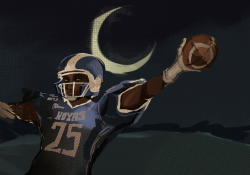Two weeks ago, the number of Georgetown students who knew who Athletic Director Joe Lang is and what he does for the University could have comfortably filled a Village C dorm room. Today he’s the only man who could unite this campus. In a frenzy of accusations, anyway.
It was for a quote Lang probably thought of as little more than a throwaway. It was hardly a quote, it was only two words: Getting selected to the NCAA men’s basketball tournament every year is “an unreasonable” expectation for the Hoyas. Somehow those two words proved to be enough to “out” the once-reclusive athletic director as “the real problem.”
But how could a page-seven feature in the Washington Post sports section catapult Joe Lang from complete obscurity to all-purpose scapegoat for the Hoyas’ recent mediocrity? For anyone on campus last week, it was the flyers: 24-point Garamond on pale blue paper. On it were just the quote and the attribution; the name of the group or person who posted them was notably absent.
I’m all for the ability of students to voice their opinions, but I’ve seen little indication that anyone who’s written an indignant letter to the editor or posted a clever banner in Red Square had logged on to Nexis (available free to all Georgetown students) and actually read the fine Jan. 20 Post article by Ken Denlinger. Instead I offer this scenario: a person found the quote and ignored the rest of the article, figuring he could stir things up in the online HoyaTalk message board. A student read the quote online, took a purposeful stroll down Bank Street to Kinko’s, and made some copies. If you made these flyers, please tell me I’m wrong.
This method isn’t the exclusive domain of the Hilltop. I’ve seen it before—It’s the preferred modus operandi of sports talk radio, the haven of Bill from Waukegan and Joey from Yonkers, the walking versions of those anonymous flyers regurgitating misleading slices of reportage, trying to stir a fury into anyone who’ll listen or look.
From the bottom up, this behavior is built on a combination of childlike impatience, shoddy information and demagoguery among radio hosts and fans alike. Does second-guessing you team’s every move make you a “real fan”? How about criticizing the management at every turn? Best of all, what about taking an out-of-context quote and blowing it into a citywide scandal?
When you listen to sports talk radio, remember that real information is irrelevant or even counterproductive to the purpose of these shows. Hours of drive-time entertainment doesn’t spring from substantive reporting and challenging thinkpieces. The online forums are even more atrocious, representing mob behavior at its worst.
The Gary Smiths and Tom Verduccis of the world, great journalists who just happen to write sports, don’t get the celebrity and exposure of a Jim Rome type. The cream is not rising to the top of the sports journalism world; in fact, it seems to be falling to the bottom. Come on, Kornheiser—PTI? You’re a good columnist, why whore sound bites?
My point is, these formats do not encourage originality, they encourage herd mentality. Moreover, when people say unoriginal things, they tend to say it unoriginally. Next time you’re on a long cross-country drive, give up the license-plate spotting, tune in to the local sports talk station and listen to the clich?s fly. Sadly, I see it perpetuating a vicious cycle: clich?d reporting makes for reporters who rely on clich?s , and the sports fans who rely on those reporters let the speculation and sound bites stoke this ill-founded fury.
Do yourself a favor if you’re a talk radio junkie or a HoyaTalk regular: Break out of the cycle and take a few minutes to get the real story. Read what Joe Lang really said on page 12, and spare our campus your outrage.




